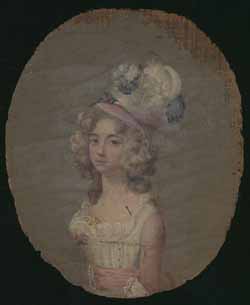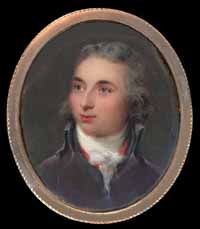Headnotes
John Quincy Adams as Diplomat
(September 1794 to August 1801: the Netherlands and Prussia)
This seven-year period launched John Quincy Adams’ (JQA) extraordinary life of public service, brought him to maturity, and marked the way for his professional and personal future. His appointments at The Hague and Berlin, at a critical time in European history, provided indispensable training and knowledge that would serve to make him the preeminent American diplomat of the first quarter of the nineteenth century. His courtship and marriage to Louisa Catherine Johnson (LCA) in 1797 ushered in a new phase of his life and the concomitant pleasures and responsibilities of being a husband and father. LCA’s frequent health issues and failed pregnancies weighed on him, and he rejoiced in the birth of their first son, George Washington Adams (GWA), in April 1801. Adding to the complexity of his public life was the fact that his father John Adams (JA) held the presidency from 1797 to 1801. JQA, particularly sensitive to any hint of nepotism, found the relationship uncomfortable at best. While abroad, he sent scores of letters to the U.S. secretaries of state that offered detailed reports on the civil, diplomatic, and military events in Europe. His letters to family members were also an important source of news for JA during his presidency. His diary provides a more intimate view of the world through which he travelled, with unvarnished observations of the people and societies he encountered.
JQA received word of his appointment as U.S. minister resident to the Netherlands on 5 June 1794. He sailed to his posting, by way of England, on 17 September aboard the ship Alfred, a vessel he described as “a dull sailor” and “moreover old, crazy and leaky.” His brother Thomas Boylston Adams (TBA) went as his secretary. The brothers arrived at London on 15 October after nearly a month’s passage. Before moving on to The Hague, JQA discussed the ongoing Anglo-American treaty negotiations with John Jay. The 28-year-old bachelor also socialized and took in the London theater. After a visit at John Singleton Copley’s home where he enjoyed the company of the artist’s daughters, JQA mused: “There is something so fascinating in the women I meet with in the Country, that it is well for me, I am obliged immediately to leave it.”
He arrived at The Hague on 31 October. Less than three months later, William V, the hereditary ruler of the Dutch Republic, was forced to flee the country, replaced by the new French-supported Batavian Republic. Although he was wary of the French, JQA did not hold a high opinion of the stadtholder. Shortly after they fled to England, he described William V as “well disposed, with a good heart & a feeble mind” and his wife Wilhelmina as “detested almost universally.” While in the Netherlands, JQA found he had too much time on his hands. His diary contains numerous examples of his frustration with diplomatic life in Europe. Dinners, theater, and concerts broke some of the monotony. However, despite it being “an easy life” he found it impossible “to reconcile it, with a disposition for activity.” One of his most important functions while as U.S. minister to the Netherlands was managing the critical relationship with the Dutch bankers who loaned money to the U.S. government, especially Jan and Wilhem Willink. As he would do throughout his life, JQA spent much of his free time reading and walking.
In October 1795, he received instructions to go to London for the exchange of ratifications of the Jay Treaty, which settled issues left unresolved between the United States and Great Britain after the Revolutionary War and preserved American neutrality. Delayed by weather, he missed the exchange. The trip, however, was not without consequence. He sat for Copley, who produced a dashing portrait as a gift for Abigail Adams (AA). On 11 November, he dined at the home of American merchant Joshua Johnson, who served as the U.S. consul at London and whose residence was a hub for Americans in that city. There he found, among the seven Johnson daughters, his future wife, Louisa Catherine. While his diary entry for that date stated that “Mr: Johnson’s daughters entertained us with good music,” a few months later, he revealed some anxiety about the path he had taken. “Ring from Louisa’s finger. . . . Placed in a very difficult dilemma. Know not how I shall escape from it.”
 Louisa Catherine Johnson (Mrs. John Quincy Adams)
Louisa Catherine Johnson (Mrs. John Quincy Adams)
JQA returned to the Netherlands at the end of May 1796. There he continued as before, recognizing that “Too much of this time is devoted to reading, and too little to Society. But I was not formed to shine in company, nor to be delighted with it.” His diary includes more about his reading than any other subject during this period. He consumed translations of Greek and Roman classics, modern histories and biographies, economics, and poetry. In addition to his own study of the Dutch language he regularly took lessons in Italian. On 6 August 1796, JQA learned that President George Washington had nominated him to be the U.S. minister plenipotentiary to Portugal, and he made preparations to move to Lisbon. In the meantime, his father succeeded Washington as president and determined his son would be of greater service as minister to Prussia. Shortly before leaving the Netherlands, JQA received notice of that appointment. Because he had resolved never to hold public office under his father’s nomination, he recorded the news as “some very unpleasant intelligence, personally concerning myself.”
Despite the regular correspondence between JQA and LCA during the thirteen months before he returned to London, there is no direct comment about LCA in JQA’s diary until he saw her again on 13 July 1797. Only two weeks later, on 26 July, they married. Not long after, he learned that Joshua Johnson’s finances had collapsed. JQA treated the issue carefully in his diary with entries such as “Mr: Johnson ill.— The cause, an unhappy one” and “the situation has become very painful.” LCA’s family left for the United States in early September.
Upon receiving his instructions and credentials, JQA set off for Berlin with LCA and TBA, arriving on 7 November. JQA was charged with renewing a treaty with Prussia as well as providing intelligence concerning events in Europe. Life in Berlin—both professionally and personally—tested the young American diplomat. Less than two weeks after his arrival, King Frederick William II died, rendering JQA’s credentials invalid. On 19 November, LCA suffered the first of at least four miscarriages that she had while in Prussia. Before the end of that month JQA confided in the diary: “I have never before in the course of my life, been afflicted with so many real and severe calamities flocking upon one another at once, as I have experienced from the day of my arrival here.”
Much of the anxiety concerning his relationship to the Prussian government was relieved when King Frederick William III made an exception and received JQA on 5 December, seven months prior to the arrival of his new credentials. Once he and LCA were presented at the Prussian court, they were expected to participate in that elaborate society. The king and queen, the extended royal family, members of the aristocracy, and many of the foreign diplomats hosted an endless round of social events. True to form, JQA participated but chafed at the obligation. “There is stiffness, coldness, formality, politeness, laboured affability, studied attention and every thing except that . . . which constitutes the charm of conviviality.” TBA’s return to America in the fall of 1798 created a void in JQA’s life. He lost a “faithful friend, and kind companion, as well as an industrious and valuable assistant.”
Whenever JQA could escape the demands of diplomatic and social duties, he continued his extensive reading, walked for exercise, and attempted to improve his language skills. “I study German between two and three hours at least every day, and make scarcely any progress.” He did, however, fulfill his major diplomatic charge when on 11 July 1799 (his thirty-second birthday) he signed a new Prussian-American Treaty of Amity and Commerce. By the end of 1799, he seemed to have settled into his life in Berlin. The exception, however, was “the state of my wife’s health . . . The subject preys upon my spirits more than I can express.”
Beginning in the spring of 1799, JQA and LCA occasionally escaped the demands of Berlin society by taking lengthy tours into the country. Each journey, in addition to relief from the city, held the promise of improving LCA’s health. The most remarkable of these was a three-month trip to Silesia beginning in July 1800. The diary includes some of JQA’s observations; however, he provided a detailed travel journal and history in a series of 28 letters to TBA, which his brother published anonymously in 1801 in the Port Folio, a new Philadelphia literary magazine.
On 26 April 1801, he received a letter of recall signed by his father. JQA had become a father two weeks earlier with the birth of GWA, recording the event in his diary, “I have this day to offer my humble and devout thanks to almighty God, for the birth of a son.” After the formalities of taking leave of the king and the Prussian government, nothing held JQA and his family in Europe. They left Berlin in mid-June and sailed from Hamburg on 8 July. Unfavorable winds delayed their arrival at Philadelphia until 4 September.
Selected Bibliography for Further Reading
John Quincy Adams, Letters on Silesia, Written during a Tour through that Country in the Years 1800, 1801, London, 1804.
Diary and Autobiographical Writings of Louisa Catherine Adams, ed. Judith S. Graham, Beth Luey, and others, Cambridge, 2013; 2 vols.
Thomas Boylston Adams, Berlin and the Prussian Court in 1798: Journal of Thomas Boylston Adams, Secretary to the United States Legation at Berlin, ed. Victor Hugo Paltsits, New York, 1916.
Margery M. Heffron, “‘A Fine Romance’: The Courtship Correspondence between Louisa Catherine Johnson and John Quincy Adams,” New England Quarterly, 83:200–218 (June 2010).
Fred Kaplan, John Quincy Adams: American Visionary, New York, 2014.
Phyllis Lee Levin, The Remarkable Education of John Quincy Adams, New York, 2015.
Simon Schama, Patriots and Liberators: Revolution in the Netherlands, 1780–1813, New York, 1977.
A Traveled First Lady: Writings of Louisa Catherine Adams, ed. Margaret A. Hogan and C. James Taylor, Cambridge, 2014.


![Miniature portrait, oil on canvas by an unidentified artist, [ca. 1792]](/database/images24/4948joshua_ref.jpg)
![Miniature portrait, oil on canvas by an unidentified artist, [ca. 1792]](/database/images24/3087catherinenuth_ref.jpg)